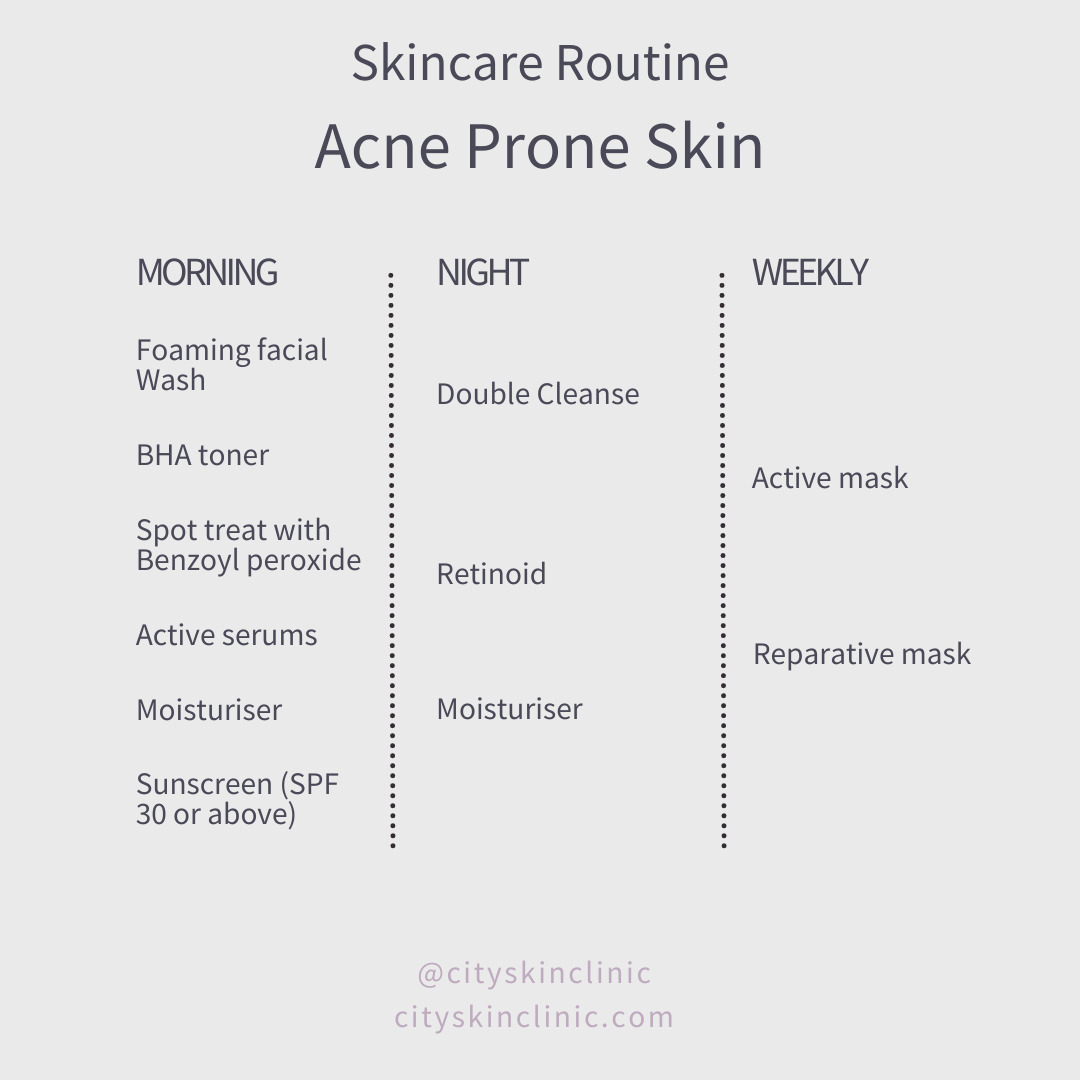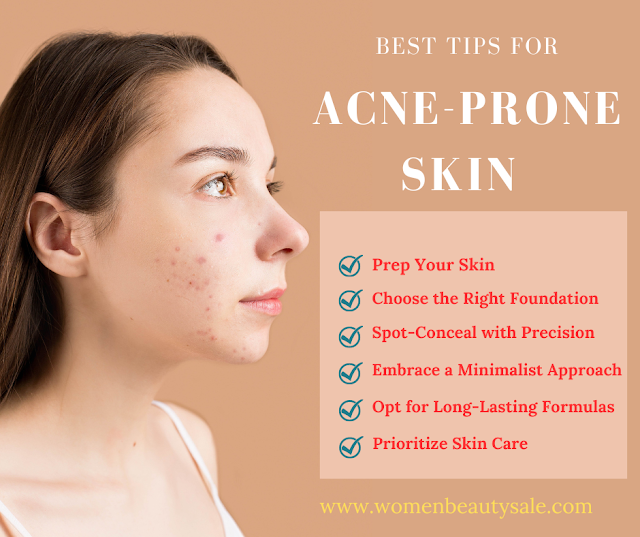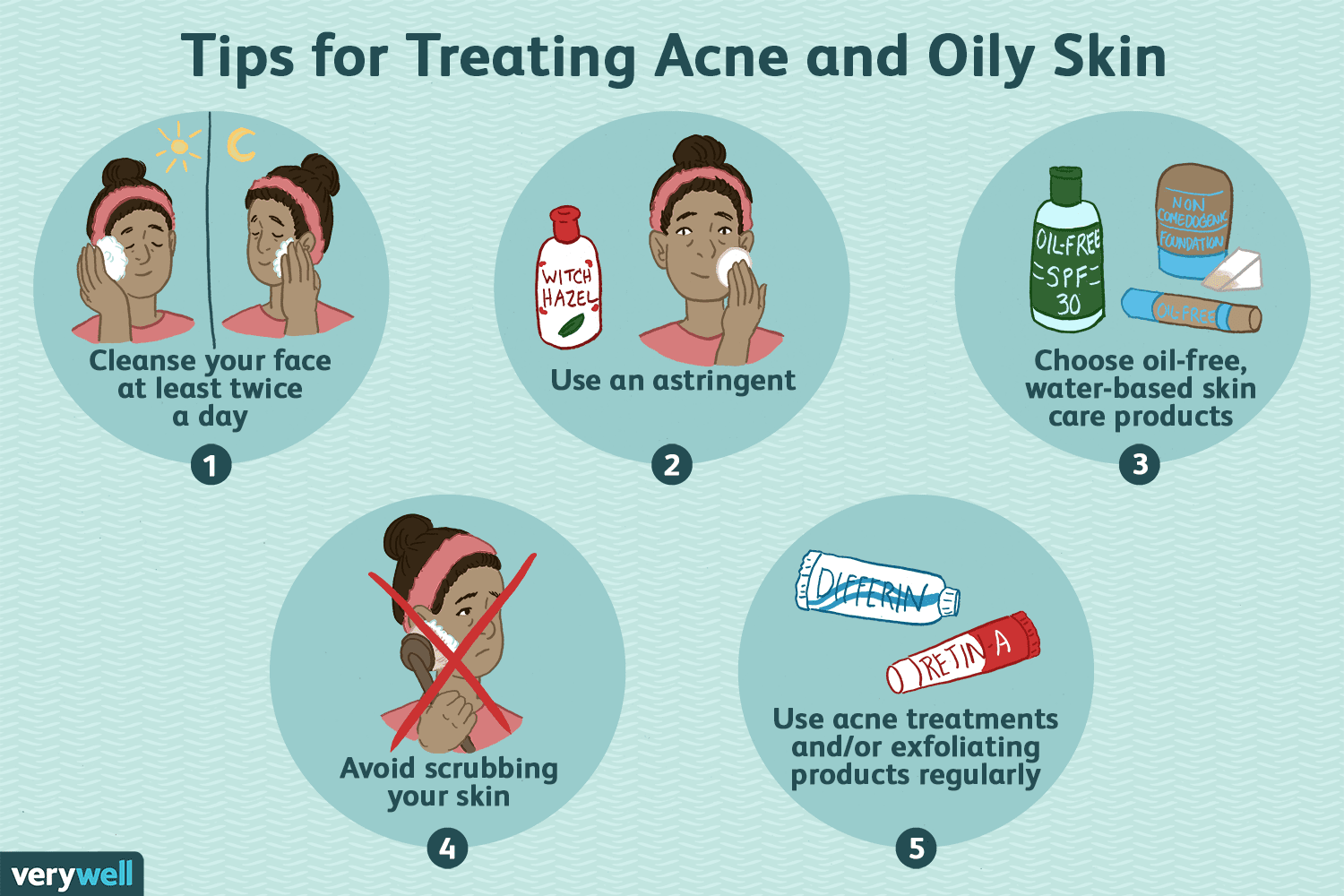For acne-prone skin, consistently cleanse with a gentle face wash and avoid heavy, comedogenic creams. Regularly change pillowcases and refrain from touching your face to minimize breakouts.
Acne-prone skin requires a delicate balance between thorough care and maintaining the skin’s natural defenses. Establishing a daily routine that includes cleansing, exfoliating, and moisturizing with products formulated for sensitive skin can make a significant difference. Choosing non-comedogenic cosmetics and skincare products is crucial to prevent clogged pores that can lead to acne.
Managing stress levels and maintaining a healthy diet also play an essential role in keeping your skin clear. Remember, treatments vary from person to person, so consulting a dermatologist can provide personalized advice for managing acne-prone skin effectively. With the right approach, you can achieve clearer, healthier-looking skin and boost your confidence.

Credit: cityskinclinic.com
The Struggle With Acne-prone Skin
Dealing with acne-prone skin is tough. Red spots, pimples, and irritation can be daily challenges. The fight against acne is more than skin deep. It affects how people see themselves. It’s a battle that needs a smart plan and the right tactics.
Common Triggers For Breakouts
Acne breakouts often start with pores getting blocked. Let’s look at what causes this:
- Hormonal changes – Big during puberty or stress.
- Oil-based products – They can block pores.
- Diet – Some foods might make acne worse.
- Lack of sleep – It can stress skin and cause pimples.
Understanding these can help prevent new breakouts.
Psychological Impact Of Acne
Acne doesn’t just affect skin. It can hurt self-esteem too. Many feel embarrassed or anxious because of their skin. This stress can sadly lead to more breakouts. It’s a cycle that’s hard to break.
It’s important to talk about these feelings. Support from friends, family, or professionals can make a big difference. Remember, you’re not alone in this fight.
Identifying Your Skin Type
Identifying your skin type is a crucial step in crafting an effective skincare routine, especially for those battling acne. Understanding your unique skin needs allows you to select products that will nurture and protect your complexion rather than exacerbate existing issues.
The Different Skin Types
Every individual’s skin falls into one of several categories. Knowing which one describes yours is the key to proper care. The main skin types are:
- Normal: Balanced moisture with few imperfections.
- Oily: Shiny complexion with larger pores.
- Dry: Rough texture with potential flakiness.
- Combination: Mix of dry and oily areas, usually oily in the T-zone.
- Sensitive: Prone to redness and irritation.
Why It Matters For Acne
Acne-prone skin demands special attention. The relationship between skin type and acne is significant:
| Skin Type | Relation to Acne |
|---|---|
| Oily | More prone to breakouts due to excess sebum. |
| Dry | Dead skin cells can clog pores, causing acne. |
| Combination | Needs targeted treatment for different areas. |
| Sensitive | May react badly to harsh acne treatments. |
Opting for products that align with your skin type can drastically reduce acne incidents. It minimizes irritation and tackles the root causes of breakouts. Test products on a small area before applying them to your entire face.
Daily Skincare Routine Essentials
Embarking on a daily skincare routine is crucial for acne-prone skin. This routine nurtures the skin, keeping it clear and helping prevent breakouts. Let’s explore the essentials that should be part of your daily skin care regimen.
Gentle Cleansing
Starting with a clean slate is essential for any skincare routine. For acne-prone skin, a gentle cleanser is key. It removes dirt, oil, and makeup without irritating the skin. Use lukewarm water and pat your skin dry with a clean towel.
Moisturizing Matters
Hydration is vital even for oily, acne-prone skin. Choose a lightweight, non-comedogenic moisturizer. It should hydrate your skin without clogging the pores. Apply it while your skin is still damp to lock in moisture.
Importance Of Sun Protection
Never skip sunscreen during the day, even when it’s cloudy. UV rays can damage the skin, leading to more breakouts. Opt for an oil-free, broad-spectrum sunscreen with at least SPF 30. Reapply every two hours if you are outdoors.
- Use a gentle cleanser twice a day
- Apply moisturizer after cleansing
- Finish with sunscreen in the morning
Diet And Acne Connection
The food you eat can affect your skin health. Understanding the diet and acne connection is essential for managing acne-prone skin. Let’s explore how certain foods may help or hinder your journey to clear skin.
Foods To Favor
Choosing the right foods can make a big difference. Here are some acne-fighting foods to include in your diet:
- Fatty fish: Rich in omega-3 fatty acids, they reduce inflammation.
- Green leafy vegetables: Packed with vitamins and minerals, they promote skin health.
- Fruits: Berries and oranges are high in antioxidants and vitamin C.
- Probiotics: Found in yogurt and kefir, they balance gut health.
- Nuts and seeds: Almonds and chia seeds offer healthy fats and zinc.
Foods To Avoid
Certain foods can trigger or worsen acne. Here is a list of foods to limit or avoid:
| Food Type | Examples |
|---|---|
| High-glycemic foods | White bread, sugary drinks, pastries |
| Dairy products | Milk, cheese, butter |
| Fatty and fried foods | Fast food, fried snacks, greasy burgers |
| Refined sugars | Candy, chocolate, ice cream |
| Processed foods | Chips, microwave meals, instant noodles |
Professional Treatments And When To Seek Them
Struggling with acne? You’re not alone. Many people find that at-home care isn’t enough. That’s when professional treatments come in. Let’s dive into what experts suggest and when to make that appointment.
Dermatologist-recommended Procedures
Expert dermatologists have a toolbox full of treatments to combat acne. These include:
- Chemical Peels: These remove dead skin and unclog pores.
- Laser Therapy: It targets bacteria and shrinks oil glands.
- Microdermabrasion: A powerful exfoliation method.
These procedures are more powerful than home treatments. They should be done by professionals.
Over-the-counter Vs. Prescription Solutions
Wondering about over-the-counter (OTC) versus prescription treatments? Here’s a quick guide:
| OTC Solutions | Prescription Solutions |
|---|---|
| Mild acne | Severe or persistent acne |
| Salicylic acid, Benzoyl peroxide | Retinoids, Antibiotics |
| Accessible, Affordable | Stronger, Targeted |
Remember, prescription treatments often work when OTC fails. Seek a dermatologist’s advice for the best course of action.

Credit: earthrhythm.com
The Role Of Makeup For Acne-prone Skin
The Role of Makeup for Acne-Prone Skin often stirs up a pool of questions. Is makeup safe? Can it worsen acne? The truth is, makeup can be a friend or a foe to acne-prone skin, depending on how you use it. The right products and techniques can conceal blemishes without triggering new ones. Let’s dive into the best makeup practices for those with acne-prone skin.
Choosing The Right Products
For acne-prone skin, selecting makeup is like picking a healthy diet — ingredients matter. Look for non-comedogenic products. These won’t clog pores. Seek out labels like ‘oil-free’ and ‘hypoallergenic’ to keep your skin clear.
- Foundations: Mineral-based options are often gentler.
- Concealers: Pick ones with salicylic acid to help heal as they hide.
- Powders: Loose, transparent powders are less likely to cause breakouts.
Application And Removal Tips
Clean tools are a must. Always use fresh sponges or clean brushes to apply makeup. Dirty applicators spread bacteria, leading to breakouts.
Application: Gentle dabbing or patting applies makeup without irritating the skin. Avoid rubbing or dragging.
Removal: End your day with a thorough cleanse. Use a gentle makeup remover followed by a cleanser suitable for acne-prone skin. Never sleep with makeup on; it can lead to more acne.
- Start with makeup remover or micellar water.
- Follow up with a gentle cleanser.
- Finish with a non-comedogenic moisturizer.
Lifestyle Adjustments For Clearer Skin
Everyone dreams of clear, smooth skin. Yet, acne can be a persistent issue. Beyond products and treatments, certain lifestyle changes can significantly improve your complexion. Embrace these tweaks to your daily routine for a healthier, acne-free skin.
Stress Management Techniques
Stress spikes cortisol levels, causing more oil production. This can lead to acne. To combat stress:
- Meditate daily to calm your mind.
- Get enough sleep; aim for 7-9 hours a night.
- Try deep breathing exercises or yoga to relax.
- Make time for hobbies that you love.
Exercise And Skin Health
Regular physical activity boosts circulation. It helps nourish skin cells and keep them vital. Sweat also clears out pores, which may reduce acne. Remember to:
- Wash your face after a workout to remove sweat and bacteria.
- Maintain a routine; even 30 minutes of daily activity helps.
- Choose non-comedogenic skincare for exercise.
Stay hydrated to help flush out toxins from your skin.

Credit: medium.com
Myths And Truths About Acne
Understanding acne is vital for proper skin care. Many believe in quick fixes or fear certain foods cause breakouts. However, it’s essential to separate fact from fiction. Let’s explore common misconceptions and truths about acne.
Debunking Common Acne Myths
Acne myths often lead to unnecessary stress and improper skin care routines. Here are some myths we need to clear up:
- Myth: Chocolate and greasy food cause acne.
- Truth: No direct link exists between these foods and acne.
- Myth: Acne is just a teenage problem.
- Truth: Adults can suffer from acne too.
- Myth: Washing your face more will clear acne.
- Truth: Overwashing can irritate the skin, worsening acne.
Facts To Remember
With myths out of the way, let’s focus on what’s true. These facts help manage acne-prone skin:
| Fact | Explanation |
|---|---|
| Acne treatment takes time. | Patience is crucial. Results can take several weeks. |
| Stress affects your skin. | Stress management can help reduce breakouts. |
| Gentle skin care is key. | Choose products designed for sensitive skin. |
Long-term Strategies To Prevent Acne
People with acne often feel a battle against breakouts. Long-term strategies can help win this fight. Simple changes and consistent steps lead to clear skin. Let’s explore these strategies.
Building A Consistent Skincare Regimen
Clear skin starts with daily habits. A good skincare routine is key. It should be easy to follow every day. Here’s how to build one:
- Cleanse: Use a gentle cleanser twice a day.
- Treat: Apply acne-fighting products that contain ingredients like salicylic acid or benzoyl peroxide.
- Moisturize: Even oily skin needs hydration. Choose oil-free moisturizers.
- Protect: Sunscreen is a must. It prevents scars from darkening.
Regular Check-ins With A Skincare Professional
Guidance from experts makes a big difference. A dermatologist can provide personalized advice. Regular appointments ensure your routine stays effective. Here’s what to consider:
| Frequency of Visits | Benefits |
|---|---|
| Every 3-6 months | Monitor progress, make necessary changes |
| As needed | Address new concerns, update treatments |
Success Stories: Real-life Transformations
Every journey to clear skin is unique, filled with its ups and downs. But the end result can be incredibly rewarding. Many have battled acne and emerged victorious, transforming their skin and life. These stories aren’t just about beauty; they’re tales of newfound confidence and self-care. Let’s dive into some inspirational journeys that remind us of the power of persistence and the right skincare routine.
Inspirational Journeys
Meet Sarah, who struggled with severe acne throughout her teen years. She tried countless products with no success. Then, she simplified her routine, focusing on gentle cleansing and moisturizing. In a year, her skin transformed, proving less can be more.
John’s story is one of patience. Frustrated by quick fixes that never worked, he turned to a dermatologist. With medical treatment and lifestyle changes, his skin cleared up. His journey teaches us the value of professional guidance.
These tales of transformation share one thing: a commitment to a consistent skincare regimen. They also highlight the importance of individualized approaches to acne treatment.
Key Takeaways From Recovery Stories
- Consistency is key – sticking to a routine makes all the difference.
- Simplicity in skincare often leads to the best results.
- Seeking professional help can be a game-changer.
- Lifestyle changes, like diet and stress management, play a crucial role.
These stories inspire and teach us valuable lessons. They show that hope exists for clearer, healthier skin. With the right approach, anyone can embark on their path to a better skincare future.
Frequently Asked Questions
What Should I Do For Acne Prone Skin?
Cleanse your skin gently twice daily using a mild, non-comedogenic cleanser. Apply a light, oil-free moisturizer and choose non-irritating, water-based makeup products. Avoid picking or squeezing pimples to reduce scarring risk. Consult a dermatologist for personalized treatment options if necessary.
What Are 3 Tips To Help Prevent Acne?
Maintain a regular skin cleansing routine, avoid touching your face frequently, and choose non-comedogenic skincare products.
How To Clear Up Acne Fast?
To clear up acne fast, wash your face twice daily with a gentle cleanser. Apply an over-the-counter benzoyl peroxide or salicylic acid treatment. Avoid picking or squeezing pimples. Keep hair and hands clean and away from your face, and consider a dermatologist’s advice for severe cases.
How Do I Get Perfect Skin From Acne?
To achieve perfect skin free from acne, consistently follow a skincare routine that includes gentle cleansing, exfoliation, and moisturizing. Use non-comedogenic products, avoid touching your face, and seek a dermatologist’s advice for persistent issues. Always protect your skin from sun damage with SPF.
Conclusion
Navigating the challenges of acne-prone skin is no small feat. Embracing these best tips can truly transform your skincare routine. Remember, patience and consistency are key. Give your skin the care it deserves and watch your complexion clear up and glow.
Let’s start this journey to healthier skin together!

